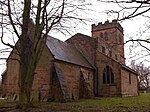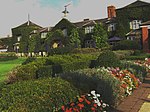The 34th Ryder Cup was held 27–29 September 2002 in England, on the Brabazon Course at The Belfry in Wishaw, Warwickshire (near Sutton Coldfield).
The European team won the competition by a margin of 151⁄2 to 121⁄2, the largest margin of victory in the Ryder Cup since the European team won 161⁄2 to 111⁄2 in 1985, also played at The Belfry. Both teams were tied at 8 points going into the Sunday singles matches. Sam Torrance had put most of his best players out early while Curtis Strange had opted to do the opposite. Momentum swung for Europe and after Phillip Price defeated Phil Mickelson 3 & 2, Europe needed 1⁄2 point for victory. The decisive 1⁄2 point was secured by Paul McGinley in his match against Jim Furyk after he holed a 10-foot par putt on the 18th hole.The victory prompted Tony Blair, then British Prime Minister to joke in his speech at the following week's Labour Party conference: "What about the Ryder Cup, eh? Britain in Europe at its best. Me and George Bush on opposite sides".The event was originally scheduled for 28–30 September 2001 but was postponed for a year on 16 September following the September 11 attacks. "The PGA of America has informed the European Ryder Cup Board that the scope of the last Tuesday's tragedy is so overwhelming that it would not be possible for the United States Ryder Cup team and officials to attend the match this month." The manager of Phil Mickelson and Mark Calcavecchia had earlier announced that the two players would not travel to Europe. Other American players were said to be concerned about attending the event. It was agreed that the same captains and players would participate in the 2002 event.
It was later decided to thereafter play matches in even-numbered years instead of odd-numbered, shifting the already-scheduled 2003, 2005, 2007, 2009, 2011, and 2013 editions to 2004, 2006, 2008, 2010, 2012, and 2014, respectively. This in turn caused a corresponding change in schedules for the Presidents Cup, Solheim Cup, and Seve Trophy (all of which are played in years the Ryder Cup is not played). The Presidents Cup was in turn delayed by a year, while both the Solheim Cup and Seve Trophy played their 2002 matches as scheduled then subsequently started playing in odd-numbered years in 2003. The Junior Ryder Cup, which was also scheduled for 2001, was rescheduled for 2002. In a case of anachronism, the display boards at The Belfry still read "The 2001 Ryder Cup", and U.S. captain Curtis Strange deliberately referred to his team as "The 2001 Ryder Cup Team" in his speech at the closing ceremony. 18 years later, these changes would be reverted by the COVID-19 pandemic, which postponed the 2020 Ryder Cup to 2021.
This was the second of seven consecutive victories at home by Europe, a streak that remains intact through 2023.





